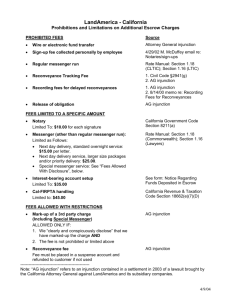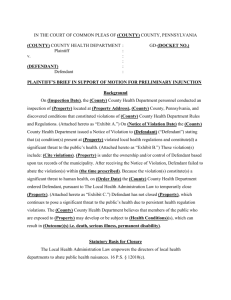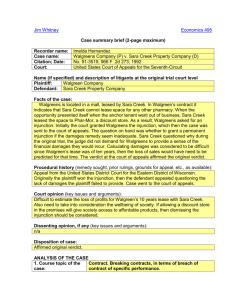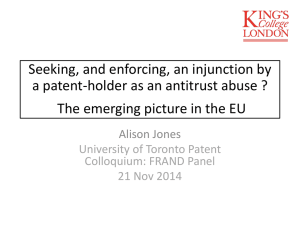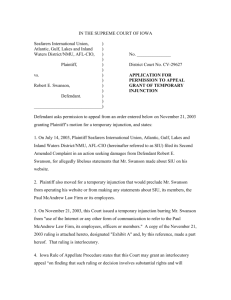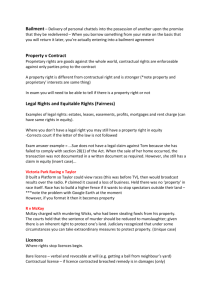Equitable Remedies Injunctions Northern London Railway Co v
advertisement
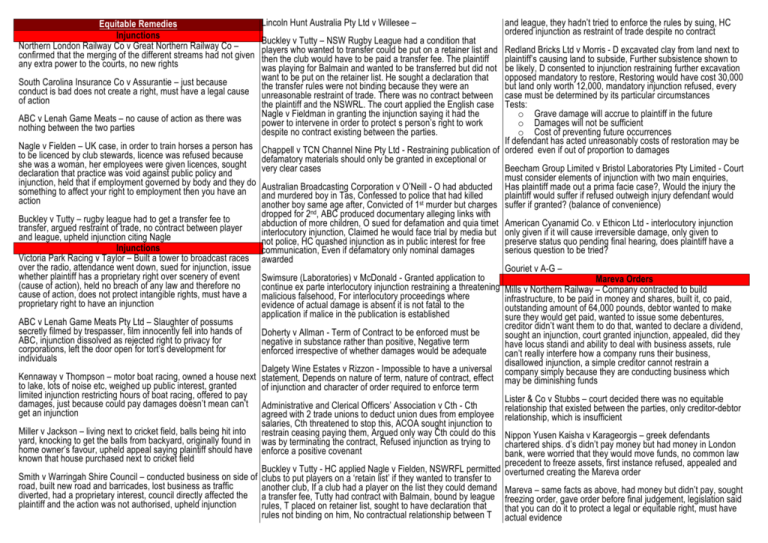
Equitable Remedies Injunctions Northern London Railway Co v Great Northern Railway Co – confirmed that the merging of the different streams had not given any extra power to the courts, no new rights South Carolina Insurance Co v Assurantie – just because conduct is bad does not create a right, must have a legal cause of action ABC v Lenah Game Meats – no cause of action as there was nothing between the two parties Nagle v Fielden – UK case, in order to train horses a person has to be licenced by club stewards, licence was refused because she was a woman, her employees were given licences, sought declaration that practice was void against public policy and injunction, held that if employment governed by body and they do something to affect your right to employment then you have an action Buckley v Tutty – rugby league had to get a transfer fee to transfer, argued restraint of trade, no contract between player and league, upheld injunction citing Nagle Injunctions Victoria Park Racing v Taylor – Built a tower to broadcast races over the radio, attendance went down, sued for injunction, issue whether plaintiff has a proprietary right over scenery of event (cause of action), held no breach of any law and therefore no cause of action, does not protect intangible rights, must have a proprietary right to have an injunction ABC v Lenah Game Meats Pty Ltd – Slaughter of possums secretly filmed by trespasser, film innocently fell into hands of ABC, injunction dissolved as rejected right to privacy for corporations, left the door open for tort’s development for individuals Kennaway v Thompson – motor boat racing, owned a house next to lake, lots of noise etc, weighed up public interest, granted limited injunction restricting hours of boat racing, offered to pay damages, just because could pay damages doesn’t mean can’t get an injunction Miller v Jackson – living next to cricket field, balls being hit into yard, knocking to get the balls from backyard, originally found in home owner’s favour, upheld appeal saying plaintiff should have known that house purchased next to cricket field Smith v Warringah Shire Council – conducted business on side of road, built new road and barricades, lost business as traffic diverted, had a proprietary interest, council directly affected the plaintiff and the action was not authorised, upheld injunction Lincoln Hunt Australia Pty Ltd v Willesee – Buckley v Tutty – NSW Rugby League had a condition that players who wanted to transfer could be put on a retainer list and then the club would have to be paid a transfer fee. The plaintiff was playing for Balmain and wanted to be transferred but did not want to be put on the retainer list. He sought a declaration that the transfer rules were not binding because they were an unreasonable restraint of trade. There was no contract between the plaintiff and the NSWRL. The court applied the English case Nagle v Fieldman in granting the injunction saying it had the power to intervene in order to protect s person’s right to work despite no contract existing between the parties. and league, they hadn’t tried to enforce the rules by suing, HC ordered injunction as restraint of trade despite no contract Redland Bricks Ltd v Morris - D excavated clay from land next to plaintiff’s causing land to subside, Further subsistence shown to be likely, D consented to injunction restraining further excavation opposed mandatory to restore, Restoring would have cost 30,000 but land only worth 12,000, mandatory injunction refused, every case must be determined by its particular circumstances Tests: o Grave damage will accrue to plaintiff in the future o Damages will not be sufficient o Cost of preventing future occurrences If defendant has acted unreasonably costs of restoration may be Chappell v TCN Channel Nine Pty Ltd - Restraining publication of ordered even if out of proportion to damages defamatory materials should only be granted in exceptional or very clear cases Beecham Group Limited v Bristol Laboratories Pty Limited - Court must consider elements of injunction with two main enquiries, Australian Broadcasting Corporation v O’Neill - O had abducted Has plaintiff made out a prima facie case?, Would the injury the and murdered boy in Tas, Confessed to police that had killed plaintiff would suffer if refused outweigh injury defendant would another boy same age after, Convicted of 1st murder but charges suffer if granted? (balance of convenience) dropped for 2nd, ABC produced documentary alleging links with abduction of more children, O sued for defamation and quia timet American Cyanamid Co. v Ethicon Ltd - interlocutory injunction interlocutory injunction, Claimed he would face trial by media but only given if it will cause irreversible damage, only given to not police, HC quashed injunction as in public interest for free preserve status quo pending final hearing, does plaintiff have a communication, Even if defamatory only nominal damages serious question to be tried? awarded Gouriet v A-G – Swimsure (Laboratories) v McDonald - Granted application to Mareva Orders continue ex parte interlocutory injunction restraining a threatening Mills v Northern Railway – Company contracted to build malicious falsehood, For interlocutory proceedings where infrastructure, to be paid in money and shares, built it, co paid, evidence of actual damage is absent it is not fatal to the outstanding amount of 64,000 pounds, debtor wanted to make application if malice in the publication is established sure they would get paid, wanted to issue some debentures, creditor didn’t want them to do that, wanted to declare a dividend, Doherty v Allman - Term of Contract to be enforced must be sought an injunction, court granted injunction, appealed, did they negative in substance rather than positive, Negative term have locus standi and ability to deal with business assets, rule enforced irrespective of whether damages would be adequate can’t really interfere how a company runs their business, disallowed injunction, a simple creditor cannot restrain a Dalgety Wine Estates v Rizzon - Impossible to have a universal company simply because they are conducting business which statement, Depends on nature of term, nature of contract, effect may be diminishing funds of injunction and character of order required to enforce term Lister & Co v Stubbs – court decided there was no equitable Administrative and Clerical Officers’ Association v Cth - Cth relationship that existed between the parties, only creditor-debtor agreed with 2 trade unions to deduct union dues from employee relationship, which is insufficient salaries, Cth threatened to stop this, ACOA sought injunction to restrain ceasing paying them, Argued only way Cth could do this Nippon Yusen Kaisha v Karageorgis – greek defendants was by terminating the contract, Refused injunction as trying to chartered ships. d’s didn’t pay money but had money in London enforce a positive covenant bank, were worried that they would move funds, no common law precedent to freeze assets, first instance refused, appealed and Buckley v Tutty - HC applied Nagle v Fielden, NSWRFL permitted overturned creating the Mareva order clubs to put players on a ‘retain list’ if they wanted to transfer to another club, If a club had a player on the list they could demand Mareva – same facts as above, had money but didn’t pay, sought a transfer fee, Tutty had contract with Balmain, bound by league freezing order, gave order before final judgement, legislation said rules, T placed on retainer list, sought to have declaration that that you can do it to protect a legal or equitable right, must have rules not binding on him, No contractual relationship between T actual evidence s9 Civil Proceedings Act 2011 – if the court considers it just or convenient Cretanor Maritime – Mareva order as an asset freezing right is not a type of asset forfeiture, it does not confer rights in rem, it is in personam, if more than one person has a claim at the same time you don’t get priority just because you have a Mareva order Third Chandris – the type of evidence by which the court can infer a danger of the assets being moved or destroyed, there must be facts from which a prudent, commercial and sensible businessman can properly determine a lack of default. A foreign co with assets in aus, several plaintiffs all awarded Mareva order, several factors that should be considered to have order reversed, factors: disclosure, grounds for claim, grounds for believing assets will be removed before judgement, Mareva order upheld, raised appeal that will go out of business but court upheld it saying there is good evidence that they will have funds • Plaintiff should make full disclosure of all matters that are material • Pl should give particulars of their claim • Pl should give some grounds for believing D had assets in jurisdiction • Pl should give some ground for believing D will remove assets from jurisdiction • Pl should undertake damages Northcorp – the plaintiff does not have to show that the purpose of the defendant’s intended disposition was to frustrate judgement, sufficient to show that there was a real risk that they would dispose assets and it would prevent recovery. appeal against decision, for some of 12 million, owns land which has come under sale, agreed to pay 1.6 million, assets likely to be disposed of, satisfied proper basis to grant a Mareva order Iraqi Ministry of Defence – Variation of Mareva order is allowed if it is not inconsistent with the policy for issuing the Mareva order in that particular jurisdiction. D in ongoing investigation, Pl claimed damages, granted Mareva injunction, creditors intervened and obtained leave to allow the D to pay them, court lifted injunction because the purpose of Mareva order is not to improve someone’s position. Should be allowed to pay your normal everyday commercial debts Hayden v Teplitzky – one party was trying to restrain other from dissipating assets, wanted to vary order to pay debt to creditor, court said no because if they had paid debts then there would be no money left for plaintiff A v C – can order discovery and interrogatories in aid of a Mareva order, plaintiff needs to have a proprietary claim and they need to be a beneficiary under the Mareva order Chartered Bank – if D is likely to leave the jurisdiction on short notice they can get a Mareva injunction, not English citizen but cause of action falls within jurisdiction so can make orders relating to this cause of action, irrelevant if not a citizen defaulted, nobody paid anything, L thought was trying to remove assets from Hong Kong, if no cause of action in HK can you have a Mareva order in that jurisdiction, no they could not because there is no jurisdiction to allow a service on the basis of an application not based on a substantive cause of action in that Barclay-Johnson v Yuill – claimed owed money, seeking jurisdiction, injunction must be incidental to a substantive right not continuation of Mareva injunction, real risk would remove money necessarily a cause of action, D subject to court’s jurisdiction because was living on a yacht outside jurisdiction, granted should be ordered in a foreign court if judgments of that court are continuation of Mareva injunction, real risk of evasion. nationality enforceable in that jurisdiction (reciprocity) is just another factor that needs to be taken into account Fourie v Le Roux – applied for freezing order, after that breached Rahman – Mareva injunction can be granted against anyone who another different freezing order and removed all assets to is living within the jurisdiction even though no information about another jurisdiction, was it enough that it would likely occur again them because real risk of removing assets if injunction not against the plaintiff’s Mareva order, court held there was no granted jurisdiction because it was not an immediate cause of action, he only had a hunch and was not intending on starting an action Bank of NZ v Jones – an injunction will not be granted a person immediately, must come with clean hands, abusing remedy who is not a party to the action, moved assets into joint bank account, argued that the money was there entirely for living Camdex International Ltd v Bank of Zambia – Bank of Kuwait expenses, wanted to freeze that money as well, said wife was not deposited 80m with BoZ, BoK realised that wouldn’t return the a party so not granted, order can cause more hardship than it is deposit, plaintiff granted Mareva order limited to assets within aiming to prevent Zambia, BoK tried to assign money to third party, BoZ had other debtors, issue whether defendant could pick and choose Z Ltd v A-Z and AA-LL – any third party who has notice of a amongst debtors to which ones they wanted to pay back, court freezing injunction will be guilty of contempt of court if they assist said although in ordinary situation they had to pay debt back, in removal of assets, 3rd parties were banks so higher test Zambian community would suffer hardship if they let go of the money, purpose of Mareva relief is to prevent a defendant from Riley McKay – removing from the jurisdiction his assets or dissipating them. It is not an aid to obtaining preference for repayment from an CBS UK – Mareva relief may be combined with the delivery of insolvent party. chattels subject to restrictions, D must be evidence likely to dispose assets, must not be assets that are not required for the Cardile – can grant Mareva order against non-party where those running of the business orders are necessary to facilitate the administration of justice but it should not be granted lightly as it will impose a significant Ballabil Holdings – transnational companies can be the subject of restriction on a defendant’s right to deal with his or her assets. Mareva orders, jurisdiction should not be a bar to injunctions Does not have to be a proprietary right, can be goodwill. Third party controls assets for you then a Mareva order can be issued NAB v Dessau – D were debt dodgers, that increases likelihood against a third party of dissipation, can have worldwide jurisdiction Pelechowski – NSW case, borrowed money but did not pay it Babanaft – Mareva injunction can be granted post judgment. back, Mareva order over property, got a second mortgage, Panama company obtained judgment against Lebanese people appealed, majority held that district court does not have the living in Switzerland, operated businesses in different jurisdictions power to grant a Mareva order where it was difficult to obtain information, worldwide Mareva order, full disclosure and oral examination as to assets. Babanaft Anton Piller Orders proviso – operation of Mareva order cannot be placed upon the third party from utilising the funds in a manner that they normally • If woman home alone must have another woman present would • Has to be a reasonable time (likelihood of contacting solicitor) Patterson –prima facie case and risk of dispersal to defeat • Detailed list of items they are taking judgment but no set test and should be determined on a case-byo Defendant must have opportunity to inspect documents case basis. and get a copy of the list • Can be a ban on speaking to other people for roving APO Mercedes Benz – entered into contract with german citizen, • Has to be someone there to represent the defendant financed $20m for contract, guaranteed by Monaco corp, both Injunctions to Enforce Negative Covenants Lumley v Wagner – L owned theatre, had contract with opera singer, had to perform for 3 months and not allowed to perform anywhere else, W offered more money, wanted to take it, L sought injunction to stop W performing at other theatre, court said they would not force her to sing (positive covenant) but they said they would enforce a negative covenant stopping her from performing, court decided that W could not perform at any other theatre but would not be forced to perform for L. The court cannot compel someone to perform for personal services, where personal services are sufficiently rare then damages are not adequate, will enforce negative covenant but not positive covenants. Wolverhampton – agreement between companies, agreed to construct railway and the other agreed to direct a certain amount of traffic through the line, directed traffic on alternate ways, sought an injunction, court considered whether negative or positive, looked at substance not form, injunctive relief must be negative in substance and language must be clear and precise, duration of services for 999 years so originally refused but overruled, if sufficiently negatively framed the court granted injunction, inactivity will be performance employer would retain the employee so no injunction would be granted. Metropolitan Electric Supply Company Ltd v Ginder – injunction will be granted if negative stipulation is implied in positive covenant, pl supplied electricity, sought to restrain them from switching to another company, damages would not be an appropriate remedy Rely-a-Bell Burglar v Eisler – court will refuse injunction if it will reduce a defendant to the position of remaining idle and leading to starvation, limited injunction was granted to stop them from becoming a shareholder and director of another company with the same interests, courts can decide on any remedy that they want to make it equitable Wood v Corrigan – court will not grant an injunction to restrain the delivery of future chattels because the contract cannot be specifically enforced, damages would be a complete remedy, payment of future goods have not been made, failed to establish elements of injunction Warner Brothers v Nelson – injunction can be granted to enforce a negative covenant in a contract of service, film artist had contract and said she wasn’t allowed to perform with anyone else, entered contract with 3rd party, sought injunction and it was Doherty v Allman – a lease agreement with covenant to repair, sought an injunction to restrain him but this was refused because granted, clearly and concisely expressed, nature of services were special and unique it was positively framed not negatively. COMPARE Macro Productions v Pagola – court can grant injunction even if Dalgety Wine v Rizzon – Lessee breached covenant in lease agreement to maintain alcohol licence, courts have discretion to there is no proof of damages, covenant that would not perform for enforce negative covenant but there was an already an act that anyone else, attempted to perform for someone else, failed to show that any damage would flow from the breach of the has jurisdiction over the area so they said they would not restriction, injunction still granted interfere in that area even though it was negatively framed not stop the D from running their business the injunction will be granted Share Farming Agreements Miotti v Belford – cannot grant injunction for share farming agreements because it would amount to specific performance unless it is so simple it would not require continual supervision of the court or continual cooperation between the parties or personal relationships Lumley v Wagner doubted Page One Records - The defendants were a music group with an exclusive management and publishing contract. They wanted to terminate the contract and the plaintiff sought an injunction. This case differed from Lumley v Wagner because the plaintiff’s obligation of personal confidence required trust and confidence, which could not be enforced. Warren v Mendy - A boxer signed an exclusive management contract with the plaintiff. The defendant then sought to manage the boxer. Injunctive relief was obtained stopping the defendant from managing the boxer. On appeal the injunctions were discharged because there was a relationship of trust and confidence and the boxer had genuinely lost confidence in the manager. The contract also had the effect of imposing a positive covenant on the boxer. Lumley v Wagner applied yet again Hawthorn Football Club v Harding - A footballer agreed to play for a team and not to play for any others. He then sought to breach this. The plaintiff sought an injunction against him. The injunction was granted to stop him from playing for any other teams, as it did not have the effect of forcing him to play for the plaintiffs.!A person’s services can be restrained if it does not have the result of forcing them to do something. Specific Performance Warner Brothers v Ingolia – actress wanted to work for someone Elements: else, breached covenant and sought injunction, Californian • An agreement company, can you restrain someone from performing in • Breach or threatened breach of agreement by D Australia? Can restrain someone where the contract was in a o Contract not terminated foreign jurisdiction because the breach occurred in the jurisdiction • CL damages would be inadequate remedy • No discretionary defence or denial disentitling relief Atlas Steels (Australia) Pty Ltd v Atlas Steels Ltd – will not Two senses of Specific Performance enforce injunction where it would amount to a specific Whitwood Chemical Company v Hardman – brought an action Wolverhampton and Walsall Railway Company v London and enforcement to employ the person as their agent, felt that if restraining defendant from starting up business or having any North-Western Railway Company – agreed to construct railway contract with any other person, injunction would not be granted injunction was enforced only alternative would be to cease direct a certain amount of traffic towards a certain terminal, business altogether, so coercive that it would amount to specific and because it is inconsistent with the wording of the agreement, wanted specific performance, 2 distinct forms of SP, executory performance, worded negatively it was in substance a positive agreement positive but only had one negative covenant, would contract (something remaining to be done) and executed contract obligation not enforce it where it would drive the person to starvation and (the deal has been completed), two senses: proper sense and compel specific performance, a positive stipulation does not imply COMPARE relief analogous to specific performance Ampol Petroleum Ltd v Mutton – D is buying petrol from plaintiff, a negative stipulation for an injunction it must be negatively Situations where court will NOT grant specific performance covenant said that you shall no cease operating as a service expressed in personal service contract station or sublet the business without the approval of the P, tried Damages are an adequate remedy Davis v Foreman – employer sought to fire employee, employee to sell and P sought injunction, test was whether it was possible Loan Investment Corporation of Australasia v Bonner – Sale of to comply with stipulation by doing nothing, if the injunction will land and a loan agreement, one party repudiated agreement and sought to enforce the negative covenant not to fire, although the other sought specific performance, normally any agreement negative in form it was positive in substance and meant that the Donnell v Bennett – contract for sale of fish had negative clause to not sell to other manufacturer, sought to restrain action, granted by the court, court can grant an injunction on a negative covenant without considering whether specific performance has to be granted, has to be a clear expressly made negative stipulation
